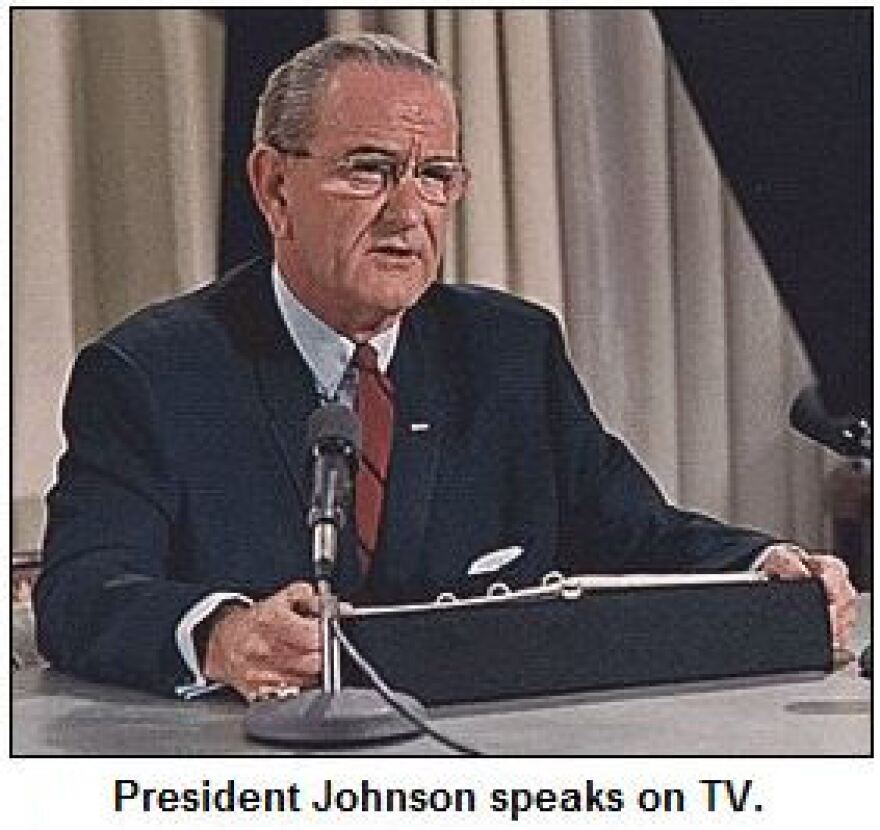Today we kick off our series, “1968, Year of Discontent,” highlighting major events of a half-century ago, with the year’s first blockbuster story.
On Sunday, March 31, 1968, President Lyndon B. Johnson addressed the nation on live television. Two months earlier North Vietnamese troops mounted the Tet Offensive: surprise attacks across South Vietnam, including one on the U.S. embassy in Saigon and the presidential palace. The action caused U.S. and South Vietnamese forces to lose control of several cities temporarily.
Johnson acknowledged that the war was dividing the nation. Towards the end of his 40-minute address, LBJ stunned the nation with a surprise announcement.
“I shall not seek; and I will not accept, the nomination of my party for another term as your President,” said Johnson, who had finished in a tie for third place in the New Hampshire Democratic primary behind Eugene McCarthy and Robert F. Kennedy.

“[Johnson] knew he had his work cut out for him, but I don’t think he necessarily knew how bad it was until after the New Hampshire primary,” said Andy Barbero, an historian at Pensacola State College. He says add to that the extent to which LBJ’s credibility and reputation had been damaged by the escalation in Vietnam.
A few weeks before LBJ’s withdrawal, Walter Cronkite of CBS, in a special report, concluded that the war in Vietnam was unwinnable.
“But it is increasingly to this reporter, that the only rational way out then, will be to negotiate – not as victors, but as an honorable people who lived up to their pledge to defend democracy, and did the best they could.”
After viewing the report, Johnson is quoted as saying “If I’ve lost Cronkite, I’ve lost middle America.”
“This is at a time when journalism is at its peak in terms of its power to influence public opinion; we don’t have cable rolling around yet,” said Barbero. “Walter Cronkite, he was a member of the family for a lot of Americans because he was in their home every single day.”

With Johnson out of the picture, much of the push among Democrats was for a “party loyal” candidate. That fell to Vice President Hubert Humphrey, who worked to set up a traditional Democratic labor coalition. But Barbero says that and other coalitions within the party were beginning to splinter.
“You have civil rights activists, Catholics, religious anti-war activists kind of coming around Robert Kennedy; Eugene McCarthy, who’s getting this solid, progressive anti-war vote,” said Barbero. “The southern Democrats, those Dixiecrats that were much more conservative, George Wallace is making a name for himself as well.”
Meanwhile, back at the White House, President Johnson had nearly a year to go until the end of his term. His effectiveness at that time is now grist for debate among historians.
“He’s able to keep the war going – there’s definitely that,” said Barbero. “But in terms of his ability to use his bully pulpit or influence public opinion, it’s really at a low,” said Pensacola State’s Andy Barbero, who contends that LBJ is not given enough credit for his domestic policies, aka the Great Society, which include passage of the Voting and Civil Rights Acts; along with Medicare and Medicaid.
“[Johnson] said that segregation was leading to the detriment of African-Americans; but he said that segregation was also distracting the white South from its own poverty and destitution,” Barbero said. “So therefore, it had many layers to it.”
Lyndon Baines Johnson passed away of a heart attack on January 22, 1973, at the age of 64; one day before the Paris Peace Accords ending the Vietnam War were concluded and two days after what would have been the end of his second term, had he run and been reelected in 1968.




